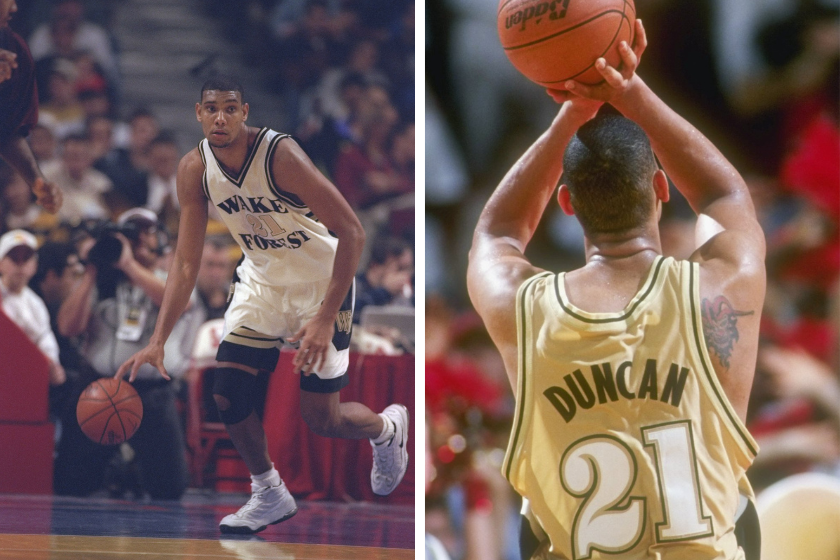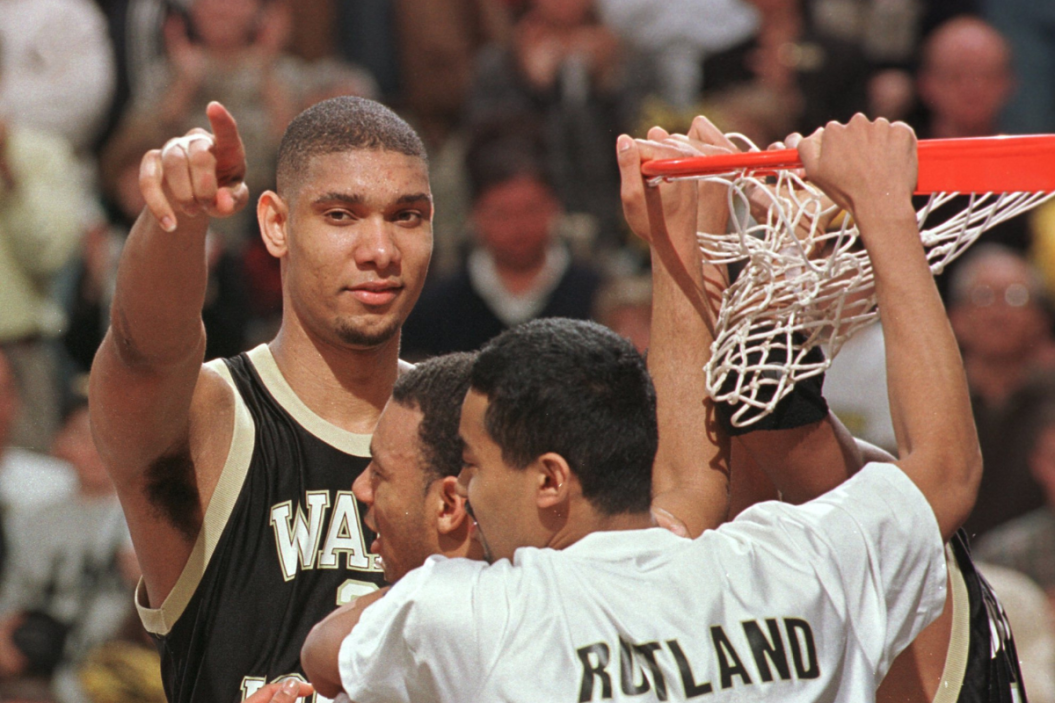Tim Duncan might be underrated. That's weird to say for a five-time NBA Champion and 15-time All-Star. The Big Fundamental was vanilla compared to peers Kobe Bryant, Shaquille O'Neal, and Kevin Garnett. Yet, he dominated on the court and the backboard was his best friend.
Videos by FanBuzz
Tucked behind an outstanding NBA career with the San Antonio Spurs, the future Hall of Famer's tenure as a Wake Forest Demon Deacon is just as incredible.
Here's what Duncan achieved in college:
Tim Duncan's Wake Forest Career

Left: Photo by Jonathan Daniel /Allsport via Getty Images, Right: Photo by Doug Pensinger /Allsport via Getty Images
RELATED: Was Larry Bird the Most Dominant College Player Ever?
- Consensus National Player of the Year (Naismith College Player of the Year, Wooden Award, Oscar Robertson Trophy) (1997)
- Two-time Consensus first-team All-American (1996, 1997)
- NCAA Rebounding Leader (1997; 14.7 per game)
- Three-time NBA NABC Defensive Player of the Year (1995-97)
- Two-time ACC Player of the Year (1996, 1997)
- 457 rebounds in a single season (1997; 19th all-time)*
- 29 double-doubles in a single season (1997; 11th all-time)
- 17 consecutive double-doubles (Nov. 26 1996-Jan. 28 1997; 21st all-time)
- 1,570 career rebounds (1993-97; 2nd all-time)*
- 12.3 career rebounds per game (1993-97; 21st all-time)
- 481 career blocked shots (1993-97; 4th all-time)
- 3.76 career bocls per game (1993-97; 19th all-time)
- 2,000 points & 1,000 rebounds club: 2,117 points & 1,570 rebounds (1993-97)
- 87 career double-doubles (1993-97; 2nd all-time)
*Rankings since 1973, per the NCAA
Born in St. Croix, U.S. Virgin Islands, Duncan was naturally a swimmer growing up. After Hurricane Hugo destroyed the Olympic-sized pool on the island, Duncan took up basketball. He overcame the learning curve and gained interest from Wake Forest University men's basketball coach Dave Odom. The power forward took off for Winston-Salem and joined guard Randolph Childress, one of the best players in the ACC. Childress is most known for his 1995 ACC Tournament performance. Over the course of three games against Duke, Virginia, and North Carolina, Childress averaged 35.7 points on the way to the ACC title.
Wake Forest made the NCAA Tournament every year of Duncan's college career. Their best run was during Duncan's junior year when they reached the Elite 8 but fell to Kentucky. Personally, Duncan continued to improve each year and was undoubtedly the best player in college basketball by the time he left Wake Forest.
If Duncan came around today, he would be an anomaly. He played all four years; first, to mature and grow his game, and second, to fulfill the promise to his late mother of obtaining a college degree.
https://twitter.com/lukeknox/status/1246923426780110849
Nowadays, it's all about potential. Duncan was fully-ready for grown man basketball by the time he was the No. 1 overall pick in the 1997 NBA Draft. He averaged 21.1 points per game and 11.9 rebounds out of the gate, walking away with the NBA Rookie of the Year Award in 1998. The next year, the Spurs beat the New York Knicks to capture their first title in franchise history.
Five NBA Championships, three NBA Finals MVPs, and 10 All-NBA First Teams over 19 years, Duncan is one of the most accomplished players in NBA history. The decorations don't stop with retirement. A Naismith Memorial Basketball Hall of Fame induction is coming in August that will cement him as one of the greatest basketball players ever.
These days, Duncan is doing what he does best: staying out of the spotlight. He serves as an assistant coach under longtime Spurs head man Greg Popovich. Players can count on blank stares and a billion individual texts intended for the team group chat when Coach Duncan responds on his flip phone.
